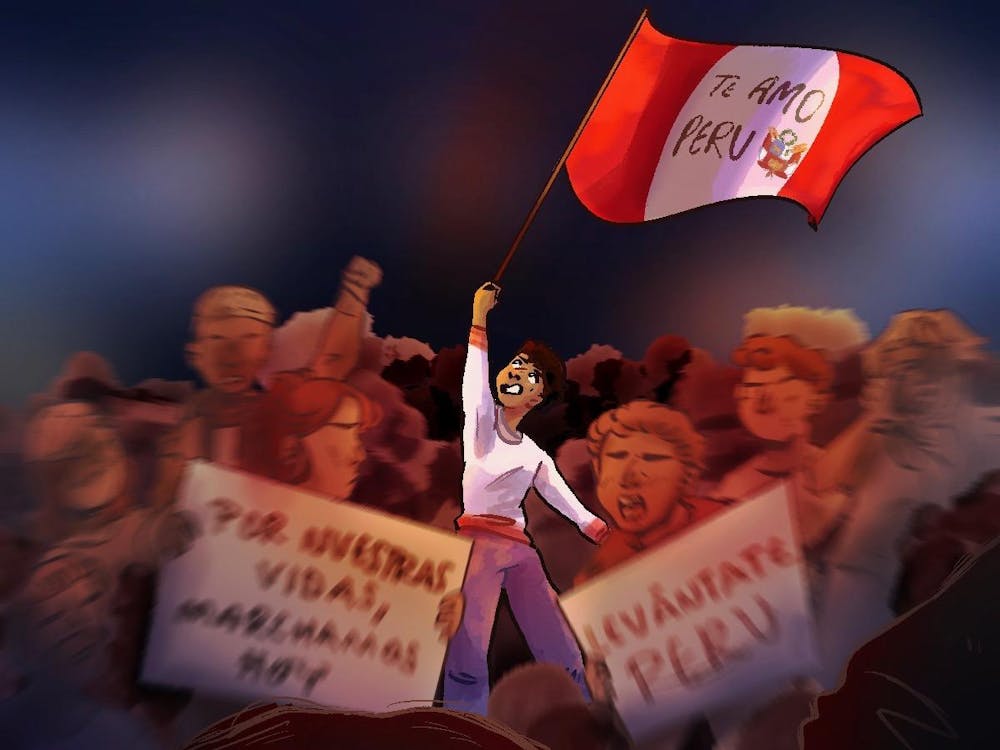Peruvian President José Jerí declared a state of emergency in his country Oct. 21 to quell civil unrest in the cities. Now, the declaration carries into its second week with no significant signs of change.
The effects of the violence in Peru carry all the way to Gainesville, with UF and Santa Fe College students and professors voicing their concerns. Students say they’re in constant communication with family back home, and some worry about returning home for the upcoming holiday breaks.
Jerí was appointed to the presidency Oct. 10 after former President Dina Boluarte’s impeachment. She was ousted for not being able to control protests and the country’s soaring crime rate, according to the New York Times.
The same week, young Peruvians protested across the country’s capital city, Lima, for a better government and for Jerí’s resignation. One person was killed and about 100 more were injured, according to the Associated Press. Jerí refused to resign.
Ericka Ghersi, a 53-year-old professor at Santa Fe College and the president of the Latina Women’s League in Gainesville, said she returned from a trip to Peru on Sunday.
Before going, Ghersi said, she heard about the situation in the country but felt the U.S. media were exaggerating it. She said she was considering buying a residence there, but when she arrived, she realized how bad the violence was.
Ghersi had visited Peru earlier in 2025, she said, but at that point she had only heard of isolated violent incidents.
“The situation is increasing. … This is not the same,” Ghersi said.
Ghersi said she is worried about her students having to return home, because they might face dangerous living conditions, especially for those who live in low- and middle-class areas.
Peru’s state of emergency is scheduled to end in 16 days, but the government instability does not appear to have the same forecast.
Peru’s 2026 presidential election has over 40 candidates on the ballot, according to Peru’s National Jury of Elections. Presidents serve a five-year term, but due to violent protests and impeachments, Peru has had eight presidents in the past 10 years.
Gabriella Garibaldi, a 21-year-old Peruvian UF psychology senior and president of the university’s Hispanic Student Association, said she doesn't expect anything to change during this state of emergency.
“There’s been such a constant expectation of our government not serving us or having the people’s needs in mind,” Garibaldi said. “We see presidents make the same mistakes and get impeached for the same reasons.”
To see if change sticks this time, she said, Peruvians will have to wait until the end of the state of emergency. The higher military presence has suppressed more violent protests, she added.
Like other Peruvians at UF, Garibaldi is thousands of miles away from her family, but she said she is grateful to stay informed through them.
“I hear from them, and I hear what the real implications look like. … Their safety is still OK,” she said.
For other Peruvian students at UF, the civil unrest sweeping the country has caused personal anxiety and distress for the safety of family back home.
Ivanna Revoredo, a 21-year-old UF business administration senior, is from Santiago de Surco, a district of Lima that is less than 7 miles from the site of the largest protests.
“Everything is very insecure right now,” she said.
Extortion, political unrest and violence are among Revoredo’s biggest concerns. She said when she left Peru in August, these issues were bad. Now, they are worse.
Despite the unrest, Revoredo said she plans to return home during the holiday season, but she will have to be more aware of her surroundings when walking the streets.
She said she thanks technology for allowing her to keep track of her friends’ and family’s locations. Without it, Revoredo said, she would feel lost.
“We are in constant communication, and I know they are safe,” she said.
As of Nov. 5, Peru is rated a Level 2 on the U.S. Department of State’s travel advisory list, meaning to exercise increased caution. Some regions of the country have been upgraded to a Level 4: Do not travel.
Contact Noah Lantor at nlantor@alligator.org. Follow him on X at @noah_lantor.

Noah is the Spring 2026 multimedia editor. He previously worked as the assistant multimedia editor for one semester and as a staff photographer for two semesters covering community stories and sports across Gainesville. Before his time at UF, Noah worked on the sidelines at Maryland and Penn State photographing their football teams. He has also done freelance and graduate photography work in his home state of Maryland. In his free time, he enjoys following hockey, football and traveling to rural places.






